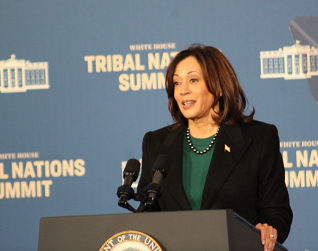
- Details
- By Native News Online Staff
WASHINGTON — Vice President Kamala Harris addressed the White House Tribal Nations Summit on Wednesday afternoon about an hour after President Biden spoke. The vice president stressed the importance of the maintaing strong relations between the federal government and the 574 federally recognized tribal nations across Indian Country.
"Your commitment to building -- and our commitment together to building a strong nation-to-nation relationship is so very important," Harris said.
In order to build a brighter future in Indian Country, Harris said "we must also speak truth about the full history of the relationship between the federal government and Native Tribes -- a history that includes broken treaties, harmful assimilation policies, displacement, dispossession, and violence."
 Make A Donation Here
Make A Donation Here
She then addressed the dark history Indian boarding schools in the United States when it was a federal government policy to have Native American children placed in boarding schools in an effort to assimilate them into American society.
Here is the text of her comments on about Indian boarding schools, as relased by the White House on Friday:
"For too long, our country did not fully acknowledge or reckon with this history, and that was particularly true on the issue of Native boarding schools.
For generations, Native children were torn from their families and their communities, forced to change their names and cut their hair, forbidden to speak their language or practice their religion.
In boarding schools, many Native children endured horrific physical, emotional, and sexual abuse. These acts were not only a violation of basic human rights but also an attack on the very existence of Tribal Nations, a systematic attempt to erase Native culture and Native identity.
President Biden and I are committed to speaking truth about these horrors and to work on healing intergenerational trauma.
Under the leadership of Secretary Haaland, we have created the first official list of boarding schools that received federal support; we have identified dozens of marked and unmarked graves associated with those schools; and launched an oral history project to collect the stories of the survivors, many of whom are now the elders, to create a permanent record of these abuses so they can never be denied."
More Stories Like This
Native News Weekly (August 25, 2024): D.C. BriefsZuni Youth Enrichment Project Announces Family Engagement Night and Spring Break Youth Programming
Next on Native Bidaské: Leonard Peltier Reflects on His First Year After Prison
Deb Haaland Rolls Out Affordability Agenda in Albuquerque
Boys & Girls Clubs and BIE MOU Signing at National Days of Advocacy
Help us defend tribal sovereignty.
At Native News Online, our mission is rooted in telling the stories that strengthen sovereignty and uplift Indigenous voices — not just at year’s end, but every single day.
Because of your generosity last year, we were able to keep our reporters on the ground in tribal communities, at national gatherings and in the halls of Congress — covering the issues that matter most to Indian Country: sovereignty, culture, education, health and economic opportunity.
That support sustained us through a tough year in 2025. Now, as we look to the year ahead, we need your help right now to ensure warrior journalism remains strong — reporting that defends tribal sovereignty, amplifies Native truth, and holds power accountable.
 The stakes couldn't be higher. Your support keeps Native voices heard, Native stories told and Native sovereignty defended.
The stakes couldn't be higher. Your support keeps Native voices heard, Native stories told and Native sovereignty defended.
Stand with Warrior Journalism today.
Levi Rickert (Potawatomi), Editor & Publisher

